- Dominic Hernandez
- Community, Healthy Living, Show on VR homepage, Trending
Health tips to have your best summer yet
Don't sweat it. We've got you covered!

The lazy, hazy days of summer are here! Barbecues, swimming, pool parties, what’s not to love? The only downside: A few environmental hazards follow our fun in the sun, but, don’t sweat it; we’ve got your back. Here’s a few common problems to look out for while you’re out with family and friends.

Hydrate: There’s a reason water is the substance of life
If you’re headed to the great outdoors, especially for extended periods of time, pack plenty of water. Also know the signs signs of dehydration (headache, dizziness, excessive sweating); it can be lifesaver. Young children and older adults are more intolerant of extreme temperatures and have higher risk for dehydration.
Experts recommend consuming eight 8 oz. glasses of water a day—or more if you’re doing a strenuous activity. Don’t let thirst be a deciding symptom. If you are thirsty, you’re already dehydrated.

Beat the heat: Be wary of heat exhaustion
Anyone up for a game volleyball? How about a nice day at the park? If you plan on being in the sun for long periods of time, stay ahead of heat exhaustion. A high heat index, high humidity, and the amount of liquids you’re taking in all play a role in the development of heat exhaustion.
Heat exhaustion is often accompanied by dehydration, so look for those signs, as well as other symptoms like nausea, vomiting, muscle cramps or loss of consciousness. Take plenty of water if you plan on being outside for long periods of time, and rest indoors or in a cooler environment if you feel like the heat is overwhelming you.

Keep the sun at bay with sunblock
Nothing will ruin a week like a sunburn. We’re all guilty of overstaying our welcome in the sun, or forgetting to cover our face and neck. Either way, sunblock is important, and it’s recommended that you use sunblock with at least an SPF of 15 and reapply according to the directions on the label.
If the dreaded sunburn does happen, you should apply cool compresses to affected areas, and/or pure aloe vera gel. It’s okay to take acetaminophen to help relieve the pain, however, if your skin starts to blister, or you experience additional symptoms like nausea or trouble breathing, seek medical attention immediately.

Don’t let bugs be a buzzkill
Picnics, pool parties and hikes are all great ways to get fresh air, and in the haste to go outside we often forget we share this space with bugs and insects. Mosquitos, spiders, and ticks all carry and transmit diseases, such as the Zika virus, Lyme disease and others that can really put a damper in your summer itinerary.
If you plan on being outside often, wear a light weight fabric that covers your arms and legs, and apply insect repellent that contains at least 20 percent or more DEET—then reapply as directed.

Say no to swimmer’s ear
You’ve just returned from a fantastic trip to the beach and suddenly your ear begins to hurt. Chances are, you may be suffering from swimmer’s ear—a common infection caused by bacteria in the water.
Symptoms for swimmer’s ear include general discomfort in the ear canal and drainage. Call your doctor if you have severe pain or if a fever is present, and remember, don’t use cotton swabs to try and clean the ear as this can damage some of your ear’s natural defenses.

Sunglasses are more than a fashion statement
Showing off your designer lenses isn’t just a fashion statement anymore. Wearing sunglasses on bright days is vital to protect our sensitive eyes from the sun. Too much exposure to UV light raises the risk of eye diseases like cataracts, growths on the eye and cancer. Wear UV-blocking sunglasses and a hat whenever you’re outside—even on cloudy days—to prevent these risks.
Media contact: media@tamu.edu


